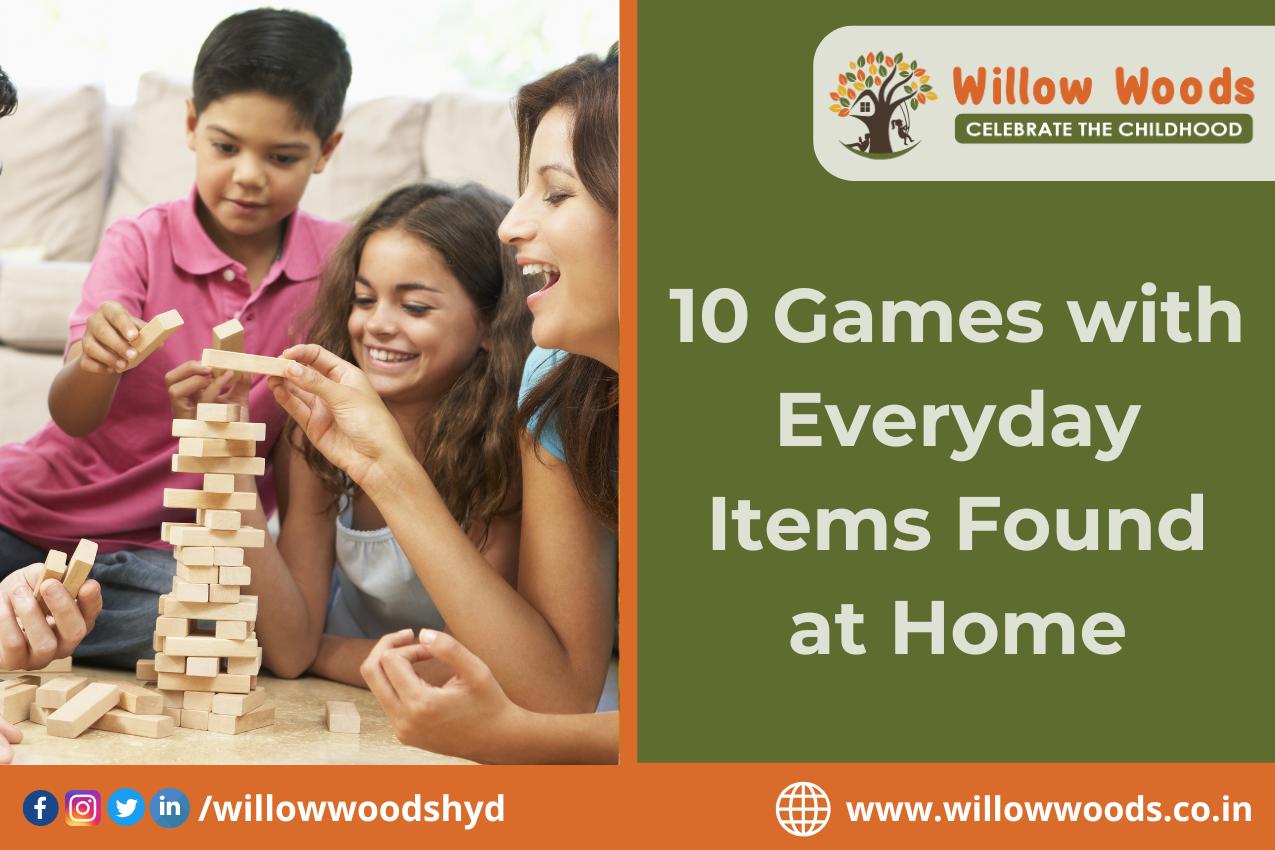Introduction Think back to your own childhood. What memories stand out the most? Chances are, many of them revolve around festivals—colourful decorations, special clothes, music, food, and the excitement of celebrating together. For young children, festivals are not just happy days; they are powerful learning experiences. At Willow Woods Pre School, festivals are celebrated with
Introduction
Looking for creative ways to keep your child engaged at home? At Willow Woods Pre School, recognized as the Best Pre School in Hyderabad, we understand that learning and fun go hand in hand. Here, we share 10 delightful games you can play with everyday household items to boost your child’s cognitive, motor, and social skills while fostering joy and laughter.
1. Scavenger Hunt
A scavenger hunt is a great way to develop observation skills. Simply list items for your child to find around the house, such as “a red object” or “something soft.” Make it more engaging by setting a timer and offering small rewards for each found item. This game can be tailored to different themes, like colours, shapes, or letters.
2. Sock Toss Game
Transform mismatched socks into a fun tossing game. Use a laundry basket or a cardboard box as the target. Have your child stand at different distances and try to toss rolled-up socks into the container. This game is perfect for developing hand-eye coordination and can be made competitive with points and challenges.
3. Paper Plate Ring Toss
Cut the centre out of paper plates to create rings and use a bottle as the pole. Your child can toss the rings from a distance and try to “catch” the bottle. This simple game encourages motor skill development and can be played indoors or outdoors. Get creative by decorating the rings together before starting the game!
4. Indoor Bowling
Create a mini-bowling alley using empty plastic bottles as pins and a soft ball. Arrange the bottles in a triangle shape at the end of a hallway or open space. Let your child roll the ball and try to knock down as many “pins” as possible. This game not only entertains but also improves coordination and strategic thinking.
5. DIY Puzzle Game
Puzzles are wonderful for problem-solving. Make your own by cutting a picture from a magazine or drawing a simple sketch and slicing it into pieces. Have your child put the pieces back together. You can start with fewer, larger pieces for younger children and gradually move to more complex puzzles as they grow.
6. Simon Says with a Twist
Everyone knows the classic “Simon Says,” but adding fun twists can make it even more exciting. Try actions that involve items around the house, like “Simon says, touch the nearest cushion” or “Simon says, jump to the door.” This variation keeps children on their toes and helps them follow instructions carefully.
7. Spoon and Ping Pong Ball Race
For a bit of competitive fun, create a race where your child has to carry a ping pong ball on a spoon from one end of the room to the other without dropping it. Add obstacles or ask them to go around furniture for an extra challenge. This game enhances balance and concentration while bringing giggles and excitement.
8. Storytelling with Props
Collect items such as toys, utensils, and random household objects and place them in a basket. Ask your child to pick out a few items and create a story using them. This game sparks creativity, enhances verbal skills, and is a great way to encourage imaginative play.
9. Balloon Volleyball
Blow up a balloon and start a game of volleyball in your living room. Use a couch or a line of pillows as the net and see how many times you and your child can hit the balloon back and forth without it touching the ground. This simple game keeps kids active and helps build agility.
10. Memory Tray Game
Place several small items on a tray and let your child study them for a minute. Cover the tray and ask them to recall as many items as possible. This game improves memory and concentration. To make it harder, add more items or remove one while your child isn’t looking and ask them to guess what’s missing.
Conclusion
At Willow Woods, the Best Pre School in Hyderabad, we believe that learning can happen anywhere, especially through play. These 10 home-based games are not only fun but help children develop essential skills that will benefit them in school and beyond. Try incorporating these activities into your daily routine to create cherished memories while nurturing growth and development.
FAQs
1. What if I don’t have the exact items listed for these games?
No problem! Be creative and substitute similar items. For example, use a small ball if you don’t have a ping pong ball.
2. How can I adapt these games for older children?
Add more complex challenges or incorporate learning elements, like maths problems in scavenger hunts or longer storytelling sessions.
3. How often should I play these games with my child?
Even playing just a few times a week can make a difference. Regular engagement helps build strong bonds and keeps learning fun.
4. Can these games be played with more than one child?
Absolutely! Many of these games can be turned into group activities, making them ideal for siblings or playdates.
5. Are these games suitable for outdoor play?
Yes, most of these games can be adapted for outdoor fun. Outdoor play allows for larger movements and added excitement.

